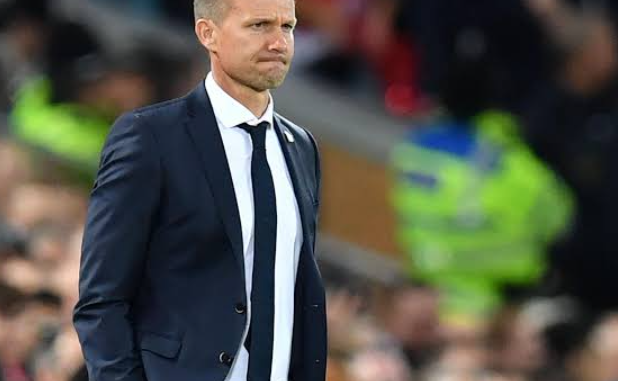
It might be an inconvenience for Jurgen Klopp amid Liverpool’s busy schedule, but for Salzburg this is the biggest match in years, and for the 45-year-old Marsch it is the most significant of his short coaching career to date, one which will require all of his communicative powers.
“Whenever I see videos of myself trying to speak German it’s always incredibly embarrassing,” Marsch says. “But in general, being here, I think it’s really important to understand the culture that you’re working in and certainly the language is a big part of that.”
Jesse Marsch delivered a passionate team talk in German and English
open image in gallery
Jesse Marsch delivered a passionate team talk in German and English (AFP via Getty)
Marsch’s German lessons began three years ago back home in the US while coaching the New York Red Bulls, as plans began to formulate for his career in Europe.
“There’s two things that come along with [speaking German]. There’s an adaptation to the culture, which includes understanding how the people work and how they think and how they talk, and there’s also showing my vulnerability, the imperfection of who I am. That’s a big part of how I coach. We have a lot of young players in our team and they have to know that making mistakes is OK. If you know German fluently and you listen to me speaking German, literally every sentence I make mistakes. So it’s then a chance for me to show improvement, show vulnerability, and work through that personally.”
His role is all about changing perceptions: of Red Bull and its place in the world of sport; of the Austrian Bundesliga which continues to stand in the shadow of its German namesake; and of American coaches in Europe – he would be the first US manager to lead a team into the Champions League knockout stages should Salzburg win.
It is hard not to be drawn in by the conviction in Marsch’s voice, whether he’s firing out a volley of swearwords during a stirring team-talk or calmly outlining his management strategy. He talks enthusiastically about leadership and giving clear direction to his players, about fading into the background and putting their needs first, about how coaching is only 25% tactical and 75% psychological.
Occasionally Marsh veers into management speak which comes with a Brentian tinge, but ultimately he is a communicator first and a tactician second, and it this ability to communicate which not only motivated his players against Liverpool but captivated us watching on our phones 24 hours later. “You can’t be emotional at every half-time because then people turn it off,” he says. “You have to have a feel for what the group needs in each moment, and in that moment, that was my feeling.”
Leave a Reply